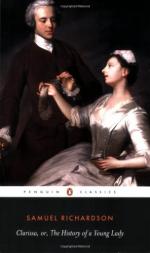MY DEAR CLARISSA,
I have at last heard from you from a quarter I little expected.
From my mother!
She had for some time seen me uneasy and grieving; and justly supposed it was about you: and this morning dropt a hint, which made me conjecture that she must have heard something of you more than I knew. And when she found that this added to my uneasiness, she owned she had a letter in her hands of your’s, dated the 29th of June, directed for me.
You may guess, that this occasioned a little warmth, that could not be wished for by either.
[It is surprising, my dear, mighty surprising! that knowing the prohibition I lay under of corresponding with you, you could send a letter for me to our own house: since it must be fifty to one that it would fall into my mother’s hands, as you find it did.]
In short, she resented that I should disobey her: I was as much concerned that she should open and withhold from me my letters: and at last she was pleased to compromise the matter with me by giving up the letter, and permitting me to write to you once or twice: she to see the contents of what I wrote. For, besides the value she has for you, she could not but have greater curiosity to know the occasion of so sad a situation as your melancholy letter shows you to be in.
[But I shall get her to be satisfied with hearing me read what I write; putting in between hooks, thus [], what I intend not to read to her.]
Need I to remind you, Miss Clarissa Harlowe, of three letters I wrote to you, to none of which I had any answer; except to the first, and that of a few lines only, promising a letter at large, though you were well enough, the day after you received my second, to go joyfully back again with him to the vile house? But more of these by-and-by. I must hasten to take notice of your letter of Wednesday last week; which you could contrive should fall into my mother’s hands.
Let me tell you, that that letter has almost broken my heart. Good God! —What have you brought yourself to, Miss Clarissa Harlowe?—Could I have believed, that after you had escaped from the miscreant, (with such mighty pains and earnestness escaped,) and after such an attempt as he had made, you would have been prevailed upon not only to forgive him, but (without being married too) to return with him to that horrid house!—A house I had given you such an account of!—Surprising!——What an intoxicating thing is this love?—I always feared, that you, even you, were not proof against its inconsistent effects.
You your best self have not escaped!—Indeed I see not how you could expect to escape.
What a tale have you to unfold!—You need not unfold it, my dear: I would have engaged to prognosticate all that has happened, had you but told me that you would once more have put yourself in his power, after you had taken such pains to get out of it.




